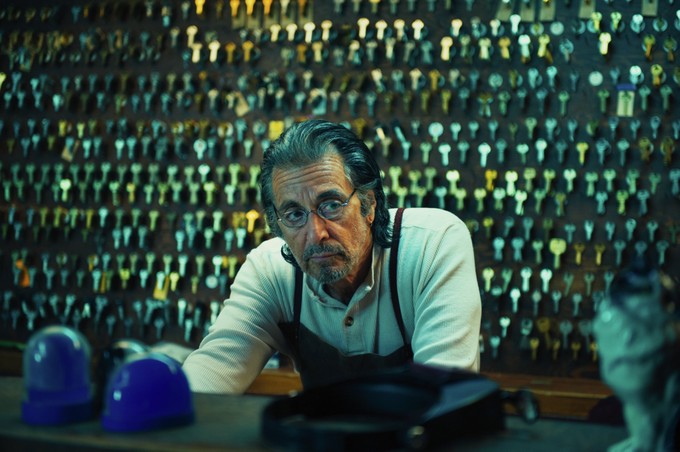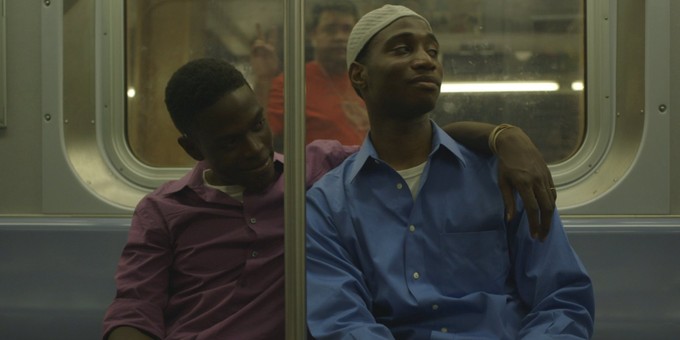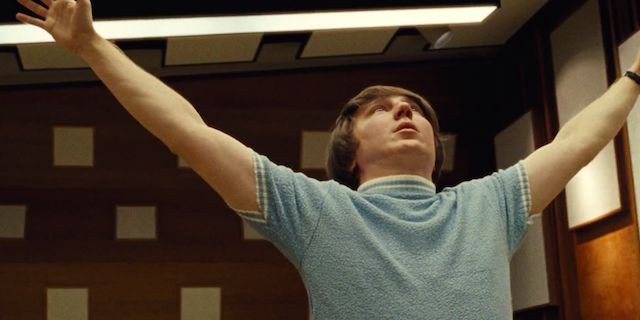
MANGLEHORN, dir. David Gordon Green
Al Pacino plays a sad sack named A.J. Manglehorn running a small locksmith in Austin. He lives alone with his cat, and his days are basically spent loafing around town, servicing locks, eating greasy local food, and occasionally flirting with a local bank teller (played by Holly Hunter). He’s a lonely guy, estranged from his commodity trader son (Chris Messina), and only remembered by the players on his old Little League team (including a shady type played by Harmony Korine. And he’s obsessed, obsessed, OBSESSED with Clara, a girl from his youth who has long since broken contact with the aging Manglehorn.
This is David Gordon Green’s third Texas-set indie drama in a row, after PRINCE AVALANCHE and JOE, and like those movies, it has a natural, rural sensibility completely removed from his studio comedies like THE SITTER or YOUR HIGHNESS. This is a movie about low-key characters who may have dreamed big once, but who’ve lived small, and it’s still impressive how restrained Green’s direction is after directing bigger, more abrasive projects like the comedies I mentioned.
But it’s called MANGLEHORN, and like JOE did for Nicolas Cage, it gives the actor playing the title character one of his best roles in years. This isn’t the big, bombastic Pacino of SCENT OF A WOMAN or HEAT, or more recently, PHIL SPECTOR or STAND UP GUYS; this is the Pacino that did most of his acting with his eyes, who had that phone conversation with Chris Sarandon in DOG DAY AFTERNOON or who coldly told his brothers how he would kill Solozzo The Turk in THE GODFATHER. His relationship with Hunter (great, as always) is a little tough to swallow, but is believable primarily because of how soulful and rich he makes Manglehorn.
Still, I don’t think this is quite as good as PRINCE AVALANCHE, or certainly JOE (which is a MUST for anyone who only knows Cage as a turned-to-11, post-ironic stereotype). MANGLEHORN is quite unlikable, but the redemptive arc his character is destined to take is plain as day from the getgo, and the emotional stakes are never that high. He’s a perpetual bridge-burner, and there’s little done to humanize him beyond how intimate Pacino’s performance is. He’s already ruined his son’s life, and that relationship is painted broadly in two admittedly intriguing scenes. Korine gets much more to do in his scene-stealing role, and the SPRING BREAKERS director lights up the screen every time his scummy Gary crosses paths with Manglehorn. But a crucial scene with Hunter goes into unbelievable territory in a way that is tough for a movie like this to come back from, and the hints of surrealism and “magic” throughout the film don’t fit in comfortably with the natural aesthetic.
If you want to see proof that Pacino can still do his thing like nobody’s business without spiking any decibel levels, this is a prime example, and a more rewarding experience than his recent THE HUMBLING. Green remains one of the few mainstream directors to transition between mass entertainment and personal stuff like this with little discomfort, and I’m sort of in love with his ambition to get this level of performance out of guys like Paul Rudd, Nicolas Cage, and now Al Pacino. Part of me expected a slam-dunk, but even though I didn’t get it, watching the film was still an affecting, gratifying experience.

NAZ & MAALIK, dir. Jay Dockendorf
It’s not easy to be a devout Muslim. It’s even less easy to be a devout Muslim-American. Harder still is being a devout Muslim-American in post-9/11 Brooklyn. But being a devout Muslim-American in post-9/11 Brooklyn who is secretly in love with his equally-devout male best friend seems…tricky at best.
That’s the story of Jay Dockendorf’s NAZ & MAALIK, which tells the story of the titular pair of African-American boys as they go through a day in their Muslim community in Brooklyn. The film opens with a discovery by Naz’s sister: a soiled condom in the trash indicates that Naz is engaging in premarital sex, which, in the Islam faith is “haram” (read: not okay). What she doesn’t know is that his bedmate is his best friend Maalik, who is equally aware of how taboo their relationship would be perceived within their community, if a little less concerned. The pair meet up and trek out into the hot New York summer to make a little side cash, attend their daily prayer, buy a live chicken for Naz’s family dinner, and to act more like a couple than they ever could in their neighborhood. Then there’s this shady FBI agent following them around, waiting to see these two Muslim boys do something suspicious…
Perhaps the biggest compliment that I can give the film is that is manages to provide a fresh look at young people in Brooklyn after 9 trillion films/TV shows about young people in Brooklyn. I’ve never seen a community quite like this on film before, and I certainly have never encountered one in real life. Not to say I don’t think lifestyles like this aren’t prominent, quite the contrary; it is only realistic to imagine that the majority of practicing Muslims, or any other faith, have to bend their ideologies to match the realities of their everyday life. These boys are good Muslims, who pray, observe Halal, honor their families, and work for their money (even if that work involves re-selling lotto tickets and SIM cards). But they love each other, and are far more concerned over keeping their parents from freaking out over their relationship than with any crisis of conscience or faith, though Naz has trouble comfortably embracing Maalik in public.
Another crucial aspect of this movie is the paranoia that Dockendorf injects into Naz and Maalik’s day via the compositions, the plot, and the dialogue. Islamophobia is not quite as prominent in New York as it was immediately following 9/11, but the relationship between black youths and the authority figures of the city has certainly not improved, and the combination of these tensions makes an obvious impact on Naz and Maalik. At their prayer group, the Imam even sets aside a welcome to the FBI agents or undercover cops that are statistically assured to be among those in service; feeling the eyes of society on them is an everyday thing for these folks, and thankfully, Dockendorf doesn’t resort to melodrama or overwrought tragedy to send the movie’s themes home. Realistically portraying these guys on a relatively average day does the job just fine.
The film was obviously done on a budget by first-time filmmaker Dockendorf, but the handheld-heavy indie aesthetic is perfectly suited to the “just another day” setup. Some of the performances are stronger than others. While Curtis Cook Jr. shines as the confident, flexible Maalik, Kerwin Johnson Jr. is a tad too rigid and innocent as Naz, though those qualities are used to great effect when he deals with Annie Grier’s headstrong federal agent. There’s also a rich appearance by newcomer Anderson Footman as another of the pair’s Muslim friends; in just a couple of short scenes, we get a good idea of both who his character is in a nutshell as well as how Naz and Malik’s neighborhood operates. Despite the low-key plotting, Dockendorf never lets the pacing get too slacked, and the film ends leaving you wanting more. Not everything is resolved, and nothing is wrapped up in a nice bow, making this seem more like the slice-of-life it obviously wants to be than any sort of grand statement on race relations or religious tolerance.
I lived in New York City for 7 years, but I never spent time with the kind of people or the kind of community that this movie portrays, and I found it both enlightening and touching to spend some time with this duo as they roam the streets and rooftops of Brooklyn and Manhattan. Not your usual love story, and a good one to boot.

LOVE & MERCY, dir. Bill Pohlad
Pretty much everyone knows the music of The Beach Boys, and most know the level of musician/songwriter Brian Wilson’s influence on said music. Many are probably aware of Wilson’s legendary mental problems, and the rift that caused between him and the other members of the band. You also might have heard the stories of Wilson’s relationship with Dr. Eugene Landy, who forcibly kept the legendary musician on a short leash via strict supervision and a regiment of psychotropic pharmaceuticals. This is all stuff that music fans, and certainly fans of The Beach Boys, have been aware of for years.
But what Academy Award-winning producer Bill Pohlad (TREE OF LIFE, 12 YEARS A SLAVE) has attempted to do with his first directorial outing in 25 years (which he allegedly sank some of his own money into) is create an emotional narrative for the events and relationships that music fans have intellectually known for years. He puts us in the shoes of Wilson himself as he delves deeper and deeper into psychosis, exacerbated by his use of L.S.D., and then of his second wife, Melinda Ledbetter, as she struggles to break his co-dependency with Dr. Landy years later. However, by intercutting the two timelines, he creates a unique understanding of this period of Wilson’s life and the impact it had on both his personal and professional life, and of just how remarkable his eventual recovery and musical comeback were.
Paul Dano plays the Wilson from the era that produced Pet Sounds and the original Smile sessions. We see him actively rebelling against the sunny, surfer-skewing style the group was known for at the time, and dedicating himself to creating something wholly original and fresh, much to the chagrin of his domineering father and his fellow bandmates. Some of the moments of Wilson searching for the odd, unique sounds that would distinguish this era of Beach Boys music reach are divine; Pohlad and Dano get the impact of watching his creative euphoria, and cleverly play on your knowledge of what the individual elements of the songs eventually built up to. Dano’s quietly vibrant in a way I’ve never seen from him before, and you are just as much with his character during his rock god moments as you are when his mental illness and rampant drug use begins creeping into his everyday life.
Cusack’s section is mostly seen through the eyes of Montgomery, and Elizabeth Banks somehow renders her somewhat one-sided character into something palpably human and believable, particularly in her character’s scenes with Wilson. We believe that she is unique in her perception of Wilson as a vulnerable man, and not an exploitable commodity, and her urge to rescue this poor man from both his demons and his domination by Landy comes off as not only natural, but imperative. Cusack himself is a revelation. I have been and probably will always be a fan, but I’d gotten used to a certain level of detached irony in his work. Not here. His uncertain body language, his shaky voice, and especially his adrift, lost eyes give off the feeling of a man so used to feeling crazy that there’s a degree of normalcy to it all. Sure, Landy’s restrictions (like a healthy diet and limited social interaction) are a pain in the ass, but really, how is he to know that he doesn’t need his help? While it’d be great if this performance led to Cusack’s first Oscar nom, I know he probably wouldn’t engage in a heavy campaign. Better off; this is one of those lovely, living, breathing performances that is maybe far too cool for Academy recognition. Paul Giamatti doesn’t get much screentime as Landy, and though he’s portrayed as something of an irredeemable criminal, we do get a sense of his snake-charming abilities as he attempts to convince Wilson and Montgomery that his methods are 100% effective and necessary.
The real-life Wilson couple (still together) gave their blessing to the film, and one of the huge advantages of that is the use of the real life Beach Boys songs; just a few bars or recognizable notes trigger our nostalgia and respect for the music, and of how much of a visionary Wilson truly was. Atticus Ross’ score and the excellent soundscape uses the sounds of their music to communicate Wilson’s mental state to the audience to great effect. When Dano’s incarnation says, “I hear voices sometimes,” we have a tangible sense of what he’s describing, putting us even deeper in the musician’s shoes. The warm palate of the ‘60s stuff contrasts wonderfully with the cold fragility of the Cusack-led ‘80s section without seeming like a GOODFELLAS/BLOW-level shift in tone in between. There’s some killer editing by Dino Jonsäter, particularly towards the end when the two storylines begin to coalesce into something more intangible and based in emotion, rather than logic, than you usually get from musical biopics.
The audience was deeply emotional after our screening of the film, and gave a unanimous standing ovation even before we learned that Wilson himself was in the house. A lot of us were crying (myself included), and those who asked Wilson and his co-panelists (including Cusack and Pohlad) questions all mentioned how much their love of the music played into their enjoyment of the film. I think that if you weren’t a fan of The Beach Boys, the film would still work as a depiction of the strain that mental illness, drug use, and artistic frustration had on this particular man’s life. But if you do like The Beach Boys, then you owe it to yourself to check this out when it comes out this June. One of the more powerful recent experiences I’ve had in a theater.
